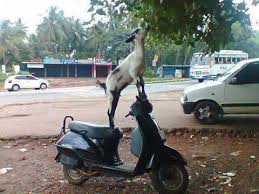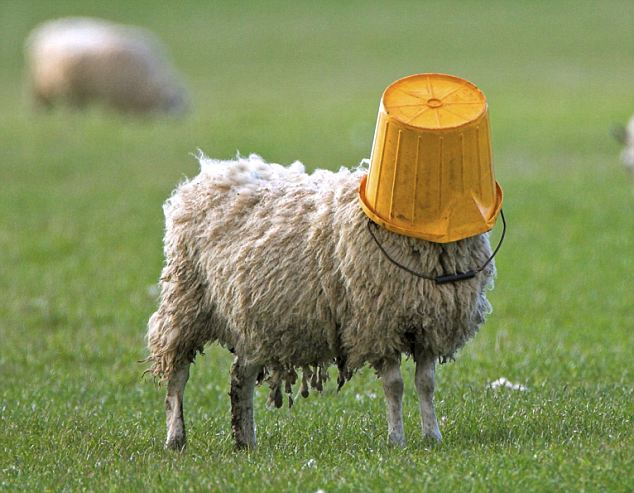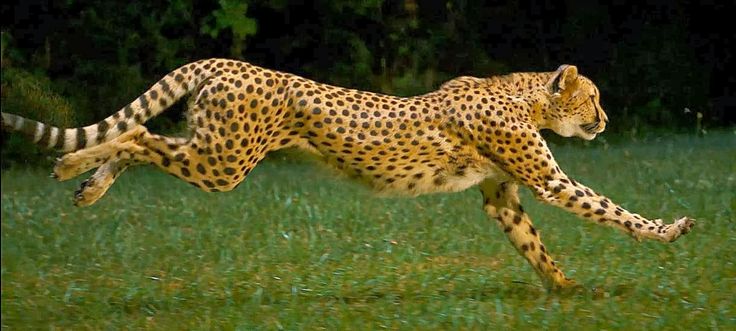Taylor Seraphim
Angel of Reason
I was not claiming that we should eat fish or take supplements.......
There are plants for that, but most vegetarians and vegans do not eat them......
Welcome to Religious Forums, a friendly forum to discuss all religions in a friendly surrounding.
Your voice is missing! You will need to register to get access to the following site features:We hope to see you as a part of our community soon!
Never Underestimate a Goat; It's Not As Stupid As It LooksHello guys.
Can someone give us answers with explanations to this?
Never Underestimate a Goat; It's Not As Stupid As It Looks
http://www.smithsonianmag.com/scien...imate-goat-not-stupid-looks-180950265/?no-ist

Eating halal-meat and vegetables is moderate way for us.
False conclusion, there are species (we humans) who eat both yet the Jerk and the Cool guy are smarter than them.
This is a goat, not a sheep. Goats are smarter than many so called humans I know of
You got that right! But they are not smarter than Smart Guy
Perhaps there are other factors to consider:
GMOs have a negligible effect on the ecosystem compared to animal agriculture. Didn't you watch the video? Cows are depleting vegetation. Temperate and rainforests are being felled to grow food for them, and the oxygen-producing oceanic phytoplankton is being killed by pollution and eutrification from food animals.Well, I am against GMO's which that changes the whole eco system of how things had worked before; but we need cows to help out with producing vegetation, and which vegetation helps out with the air we breathe. If they let the cows roam freely especially through lands that is almost depleted from vegetation; those lands will become very fertile and will start producing a lot of vegetation. But we need to not be so wasteful, but only eat what we can consume, but if unable to finish the meal, then put it up for another day to eat.
Hello guys.
Can someone give us answers with explanations to this?
Now, this jerk:
Eats plants all its life.
And this cool fellow:
Eats meat all its life.
The former is stupider, slower, weaker and in bad shape, while the latter is smarter, faster, stronger and in better shape. The former eats only plants and the latter eats only meat. Now don't tell me eating plants is better than eating meat
Do you know if you start bringing in fertilizer into deserts that these deserts will not be deserts anymore. Animals are meant to be roaming around freely, but not corralled into one spot. Herds of cows comes to graze on vegetation in certain areas. And once they had poop all over in that area, then they move to another area that is further away from that area and will not come back to that area until the ground has finished biodegrading its poop. But if you doesn't give the herd of cattle enough roaming space, then the cattle is forced to stay in that area to poop ontop of its poop around other cow's poops and eating from vegetation that is contaminated by toxic poop. We are meant to spread our poop around, but not put it into one certain area which intensify the potency of that poop that causes all sort of problems... Just imagine living next door to a poop factory.GMOs have a negligible effect on the ecosystem compared to animal agriculture. Didn't you watch the video? Cows are depleting vegetation. Temperate and rainforests are being felled to grow food for them, and the oxygen-producing oceanic phytoplankton is being killed by pollution and eutrification from food animals.
As for animals roaming free, how is that even feasible?
Just imagine living next door to a poop factory.
Could you please name these cultures? I'm genuinely interested.The cultures were people live the longest, the do eat meat, but certainly not every day. But, then again, the oldest living lady, one of only two people left alive who were born during the 1800's, has bacon and eggs for breakfast every morning.
Exactly. Grasslands are adapted to intensive animal impact -- dunging, trampling, &c. Moving herd animals maintain this ecosystem. They eat and move on. But raising food animals this way requires a lot of land per animal plus constantly moving them from pasture to pasture.Do you know if you start bringing in fertilizer into deserts that these deserts will not be deserts anymore. Animals are meant to be roaming around freely, but not corralled into one spot. Herds of cows comes to graze on vegetation in certain areas. And once they had poop all over in that area, then they move to another area that is further away from that area and will not come back to that area until the ground has finished biodegrading its poop. But if you doesn't give the herd of cattle enough roaming space, then the cattle is forced to stay in that area to poop ontop of its poop around other cow's poops and eating from vegetation that is contaminated by toxic poop. We are meant to spread our poop around, but not put it into one certain area which intensify the potency of that poop that causes all sort of problems... Just imagine living next door to a poop factory.
I remember two of them are Japanese (specific regions I can't recall) (it came from a book where the author examined the habits of the people who live where people have the longest life expectancy).Could you please name these cultures? I'm genuinely interested.
Thanks. As far as I know, the longest living populations are the Okinawans and 7th Day Adventists, so I hope we were thinking of the same thing.I remember two of them are Japanese (specific regions I can't recall) (it came from a book where the author examined the habits of the people who live where people have the longest life expectancy).
I do believe Okinawa was one of the cultures mentioned. Perhaps 7th Day Adventists were also mentioned, but there was at least one or two religious communities that were also mentioned.Thanks. As far as I know, the longest living populations are the Okinawans and 7th Day Adventists, so I hope we were thinking of the same thing.
I can assure you, it isn't anecdotal, but something I came across some time ago, not too long ago to remember the general idea (getting up and moving around and doing something about every 20 minutes was another commonly noted feature, often times some sort of gardening), but long enough to remember the specifics. It's one of those I'd like to say I could just go and type a few things in Google and bring up, but I'm going to have to do some digging and searching for it (as I don't even remember the authors name or title of the book).I also just wanted to say that you shouldn't rely on anecdotal evidence too much as they are generally misleading or an outlier.
The five regions identified and discussed by Buettner in the book The Blue Zones: Lessons for Living Longer from the People Who've Lived the Longest
The people inhabiting Blue Zones share common lifestyle characteristics that contribute to their longevity. The Venn diagram at the right highlights the following six shared characteristics among the people of Okinawa, Sardinia, and Loma Linda Blue Zones:[8]
- Sardinia, Italy (particularly Nuoro province and Ogliastra): one team of demographers found a hot spot of longevity in mountain villages where men reach the age of 100 years at an amazing rate.[2]
- The islands of Okinawa, Japan: another team examined a group that is among the longest-lived on Earth.[2]
- Loma Linda, California: researchers studied a group of Seventh-day Adventists who rank among North America's longevity all-stars.[2][3]
- Nicoya Peninsula, Costa Rica: the peninsula was the subject of research on a Quest Network expedition which began on January 29, 2007.[2][4][5]
- Icaria, Greece: an April 2009 study on the island of Ikaria uncovered the location with the highest percentage of 90-year-olds on the planet – nearly 1 out of 3 people make it to their 90s. Furthermore, Ikarians "have about 20 percent lower rates of cancer, 50 percent lower rates of heart disease and almost no dementia."[2][6]
- Family – put ahead of other concerns
- Less smoking
- Semi-vegetarianism – except for the Sardinian diet, the majority of food consumed is derived from plants
- Constant moderate physical activity – an inseparable part of life
- Social engagement – people of all ages are socially active and integrated into their communities
- Legumes – commonly consumed
Buettner in his book provide a list of nine lessons, covering the lifestyle of blue zones people:[9]
- Moderate, regular physical activity.
- Life purpose.
- Stress reduction.
- Moderate calories intake.
- Plant-based diet.
- Moderate alcohol intake, especially wine.
- Engagement in spirituality or religion.
- Engagement in family life.
- Engagement in social life.
As it says in the Bible that it weren't meant for us in the first place to eat animals, but since we lives in a sinful society that robs us from our daily supply of nutrients, that we need to eat a meal that will sustain us for the whole day or week. If we all ate organic fruits, veggies, and grains foods, that our body's will metabolizes the foods very quickly, and will be eliminated quickly from the body as well. We will have to be like cows, grazing in the fields all day just to keep the foods to sustain us for the rest of the night. But no one cannot afford to graze like cattle, they will need something more heavier that will last them for a longer period so that we can last through the day at work.Maybe if we treat meat more as an occasional food or a condiment than a main course at every meal.
